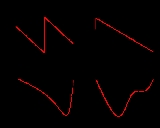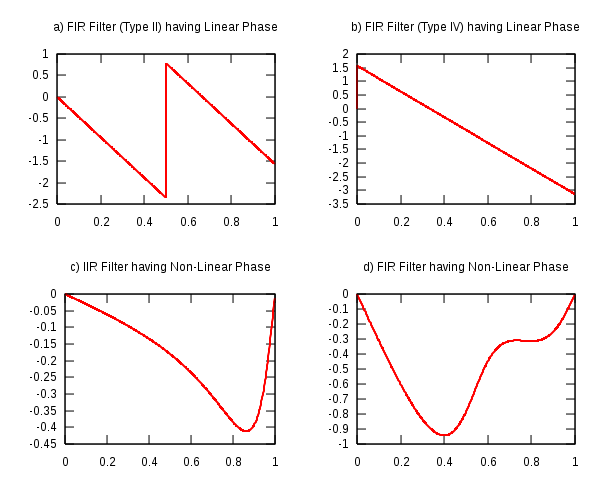
Linear phase
Encyclopedia
Linear phase is a property of a filter
, where the phase response
of the filter is a linear function
of frequency
, excluding the possibility of wraps at . In a causal system
. In a causal system
, perfect linear phase can be achieved with a discrete-time FIR
filter. Linear phase system has the property of the true time delay.
Since a linear phase (or generalized linear phase) filter has constant group delay
, all frequency components have equal delay times. That is, there is no distortion due to the time delay of frequencies relative to one another; in many applications, this constant group delay is advantageous. By contrast, a filter with non-linear phase has a group delay that varies with frequency, resulting in phase distortion
.
Some examples of linear and non-linear phase filters are given below. The plots below represent the phase response
as a function of frequency in radians ( ).
).

Filter (signal processing)
In signal processing, a filter is a device or process that removes from a signal some unwanted component or feature. Filtering is a class of signal processing, the defining feature of filters being the complete or partial suppression of some aspect of the signal...
, where the phase response
Phase response
In signal processing and electrical engineering, phase response is the relationship between the phase of a sinusoidal input and the output signal passing through any device that accepts input and produces an output signal, such as an amplifier or a filter....
of the filter is a linear function
Linear function
In mathematics, the term linear function can refer to either of two different but related concepts:* a first-degree polynomial function of one variable;* a map between two vector spaces that preserves vector addition and scalar multiplication....
of frequency
Frequency
Frequency is the number of occurrences of a repeating event per unit time. It is also referred to as temporal frequency.The period is the duration of one cycle in a repeating event, so the period is the reciprocal of the frequency...
, excluding the possibility of wraps at
 . In a causal system
. In a causal systemCausal system
A causal system is a system where the output depends on past/current inputs but not future inputs i.e...
, perfect linear phase can be achieved with a discrete-time FIR
Finite impulse response
A finite impulse response filter is a type of a signal processing filter whose impulse response is of finite duration, because it settles to zero in finite time. This is in contrast to infinite impulse response filters, which have internal feedback and may continue to respond indefinitely...
filter. Linear phase system has the property of the true time delay.
Since a linear phase (or generalized linear phase) filter has constant group delay
Group delay
Group delay is a measure of the time delay of the amplitude envelopes of the various sinusoidal components of a signal through a device under test, and is a function of frequency for each component...
, all frequency components have equal delay times. That is, there is no distortion due to the time delay of frequencies relative to one another; in many applications, this constant group delay is advantageous. By contrast, a filter with non-linear phase has a group delay that varies with frequency, resulting in phase distortion
Phase distortion
In signal processing, phase distortion or phase-frequency distortion is distortion that occurs when a filter's phase response is not linear over the frequency range of interest, that is, the phase shift introduced by a circuit or device is not directly proportional to frequency, or the...
.
Some examples of linear and non-linear phase filters are given below. The plots below represent the phase response
Phase response
In signal processing and electrical engineering, phase response is the relationship between the phase of a sinusoidal input and the output signal passing through any device that accepts input and produces an output signal, such as an amplifier or a filter....
as a function of frequency in radians (
 ).
).

